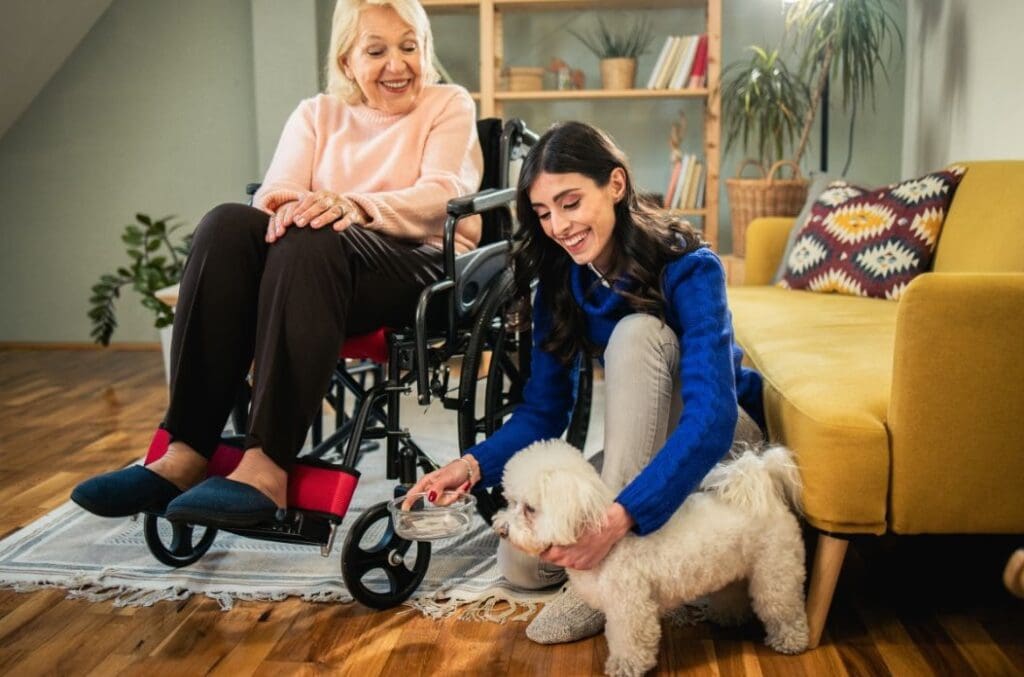Depression (depressive disorder) is a mental health condition that can be very damaging; however, it often goes undiagnosed or potentially severe consequences are overlooked.
Appropriate support is integral for an individual with depression to ensure stability and healing. If your relative or friend is suffering from depression and you don’t know how to help them, consider mental health home care.
Depression isn’t something that is healed overnight; some people have to live with depression in the long term.
Are you wondering how to help someone with depression?
A live-in carer can support your loved one 24/7 for however long they are required. They can provide specialised care, assisting you with your caring responsibilities to give you respite to care for yourself.
Continue reading to find out more about depression, how you can help, and, ultimately, how a carer can support you in guiding your loved one through this challenging time.
Understanding Depression

Before you can support somebody who has depression, you have to understand how depression appears.
No two people display the same symptoms of depression, which can make it very difficult to spot the difference between a low mood and a depressive state.
However, understanding the signs of depression is going to help you to curate your support, and these are some of the signs that you should be looking out for:
- A mood that lasts for more than two weeks. We all have low days, but if your friend or loved one is having low moods that last for weeks, then this could be a sign of depression.
- Depression can creep in gradually and over a long period. Because the condition can develop very slowly, it may take a while to realise that someone is actually experiencing depression.
- Some people who are depressed may not even realise it. Your loved one may just adapt to being continuously in a low mood.
- If an individual is napping for long periods, this could indicate depression.
- Somebody with depression is prone to low moods and irritability.
- Depression can affect a person’s appetite, which you’ll notice if they aren’t eating enough to nourish themselves.
So, if you want to know how to help someone with severe depression, follow our advice below.
Emotional Support

Below are some ways to offer your friend or loved one better emotional support.
Reassure them that it’s okay to ask for help
Assure them that seeking assistance is a sign of strength, not weakness, fostering a sense of permission to reach out for support.
Be open about depression
Share your understanding and empathy, demonstrating that you are willing to engage in open conversations without judgement or stigma.
Encourage them to share their thoughts and speak with you
Motivate them to express their feelings by actively showing interest and creating a non-judgmental environment where they feel heard and understood.
Create a safe space
Establish an atmosphere of trust and confidentiality, ensuring they feel secure to disclose their emotions without fear of criticism or repercussions.
Listen
Offer your undivided attention, validating their experiences by actively listening, acknowledging their feelings, and demonstrating genuine empathy.
Don’t be critical
Refrain from passing judgement or offering unsolicited advice; instead, focus on providing support and understanding without placing blame.
Keep in touch, whether via message or phone call
Maintain regular contact to convey a sense of ongoing support and connection, helping them feel less isolated in their struggle with depression.
Encourage Professional Help

When you are supporting somebody with depression, you must encourage professional help, but it’s not something that you should be forcing.
It’s not easy for somebody to admit that they need help, and if you encourage them to help themselves, i.e. with good food and staying active, this can be very helpful. Consider going with them on walks or taking them out to lunch.
Seek Live-In Carers
When looking for support for your relative or friend with depression, you must select the right carer.
Live-in carers offer specialised care that can prevent individuals struggling with depression from feeling isolated.
IP Live-in Care offers carers who are particularly adept in various mental health areas, including but not limited to Schizophrenia, ADHD, OCD, and specific phobias, showcasing a comprehensive understanding of diverse mental health conditions.
Depression often hampers the ability to manage routine tasks, and live-in carers can provide invaluable assistance in tackling these day-to-day challenges.
Whether it’s offering personal care or managing medical needs, these dedicated carers bring a compassionate and tailored approach to their support, contributing to the overall well-being of individuals coping with depression.
The constant presence of a live-in carer ensures practical assistance and also fosters a sense of companionship, reducing the feeling of isolation that can often accompany mental health struggles.
Assist with Daily Tasks

Supporting a relative or friend grappling with depression requires a delicate balance between offering assistance and encouraging their independence.
While taking on responsibilities like cleaning and cooking may be tempting, motivating them to engage in these activities is crucial.
Encouraging autonomy empowers individuals to regain control and accomplishment, vital components in their journey towards mental well-being.
When additional help is needed, live-in carers, such as those from IP Live-in Care, can support household chores and tasks like shopping.
This collaborative approach ensures that the person receives the necessary aid while actively participating in their daily life, reinforcing a supportive environment that contributes to their overall recovery from depression.
Encourage Physical Activity
To support a friend or relative dealing with depression, consider suggesting activities that promote both physical and mental well-being.
Encouraging a simple walk together provides fresh air, gentle exercise, and meaningful conversation.
Additionally, proposing joint participation in a class or gym can make physical activity more enjoyable and communal.
It’s essential to highlight exercise’s numerous mental health benefits, such as the increased production of endorphins, significantly uplifting mood and overall well-being.
Regular physical activity also reduces stress hormones, alleviating tension and minimising anxiety commonly associated with depression.
Moreover, exercise counteracts fatigue, bolsters energy levels by enhancing cardiovascular health, and establishes a foundation for better sleep patterns.
Importantly, engaging in physical activity is a constructive distraction from negative thoughts, offering a holistic approach to mental health support.
Monitor their Medication

Live-in carers play a crucial role in supporting individuals undergoing treatment for depression, offering consistent assistance and a compassionate presence.
While their contributions are significant, it’s equally essential for family members or friends to actively look for signs indicating the effectiveness of the treatment.
Observing positive changes, such as increased calmness, improved social interactions, healthier eating habits, and better sleep patterns, can serve as encouraging indicators. These observable shifts in behaviour or mood suggest that the individual is responding positively to the treatment.
Regular communication with both the individual and the live-in carer ensures a comprehensive understanding of the progress, enabling a collaborative approach to provide the most effective and personalised support.
Offer Social Interaction
Supporting a friend or relative struggling with depression involves thoughtful engagement and companionship.
A simple yet meaningful gesture could be offering to watch TV together or going out for a meal, creating a relaxed and enjoyable environment for connection.
Sharing a hobby can be a powerful way to bond, and exploring new activities together provides opportunities to meet others and expand their social circle.
This joint approach enhances the individual’s well-being, boosting their confidence.
For those with live-in carers, the companionship is extended to a 24/7 availability, ensuring a constant and reassuring presence and fostering a more profound sense of connection and emotional support.
Be Patient

Dealing with chronic depression requires a nuanced and patient approach.
Persistent depressive disorder (PDD) or dysthymia, a form of chronic depression, manifests through enduring symptoms that persist over an extended period. In navigating such a challenging mental health condition, patience becomes a key virtue.
Recognising that responses to treatment can vary significantly from person to person is essential. What works for one individual may be different for another, emphasising the importance of tailoring treatment strategies to the individual’s unique needs.
Remember to Support Yourself too
When caring for a loved one dealing with mental health challenges, it’s imperative to prioritise your mental well-being.
Acknowledge that your mental health is equally significant and take regular respite from caregiving duties.
Seeking support from live-in carers during these breaks allows you to relax, recharge, and attend to your needs.
This self-care approach is vital for maintaining your mental health and enhances your capacity to provide the best possible care for your loved one.
The healthier you are physically and mentally, the more effective and sustainable your caregiving efforts become.
For more information on how we can support you and your loved one dealing with depression, contact us today at IP Live-in Care.